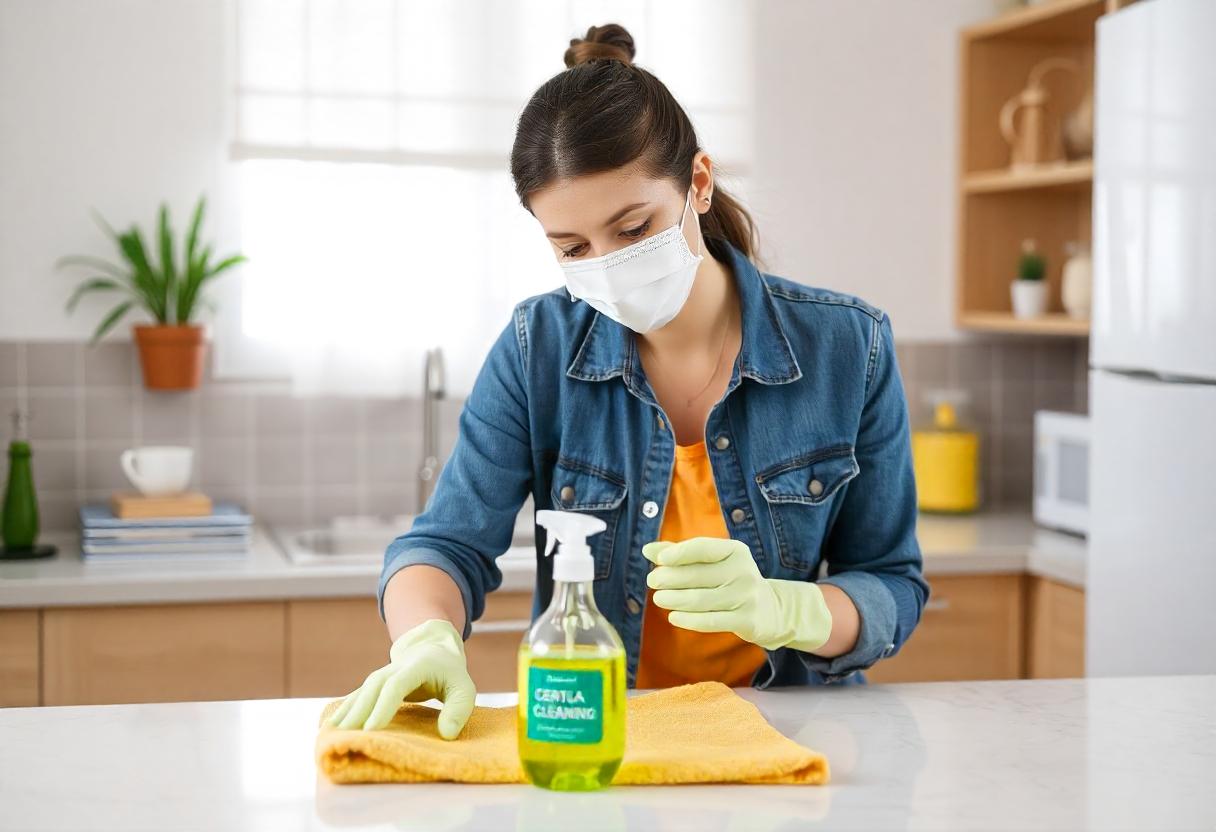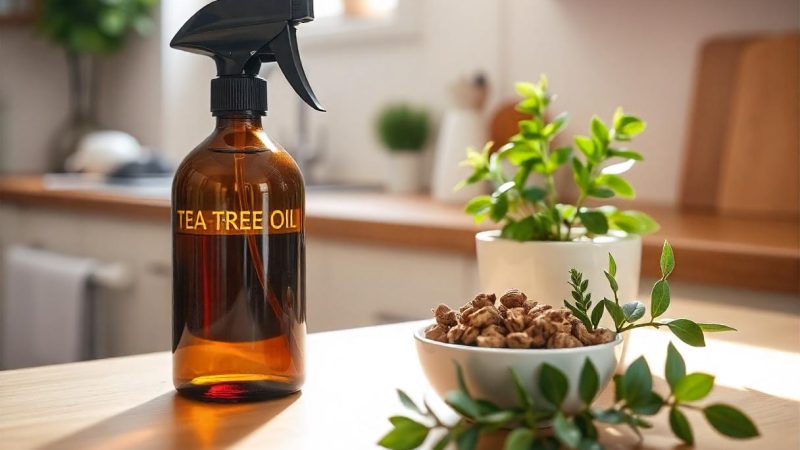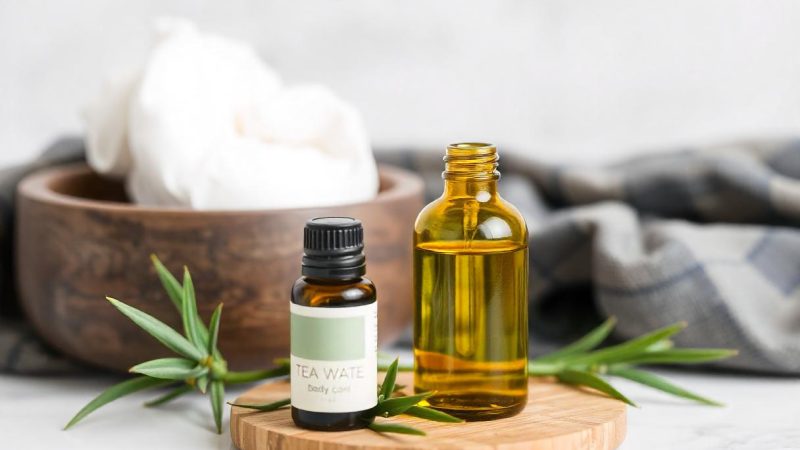Tea Tree Oil: Household Cleaning and Disinfecting

Tea tree oil, derived from the leaves of the Melaleuca alternifolia tree, is widely known for its powerful antimicrobial, antifungal, and antiviral properties. While it has long been used in traditional medicine and skincare, tea tree oil also plays a key role in natural household cleaning and disinfecting. Its ability to eliminate germs, inhibit mold growth, and freshen the air makes it a valuable and eco-friendly cleaning solution for homes. This article explores how tea tree oil can be utilized for cleaning and disinfecting, supported by scientific research and practical methods for safe use.
What is Tea Tree Oil?
Tea tree oil is an essential oil extracted through steam distillation from the leaves of the Melaleuca alternifolia plant, which is native to Australia. The oil contains active compounds like terpinen-4-ol and alpha-terpineol, which give it strong antimicrobial and antifungal properties. These properties make it an effective alternative to chemical-based cleaning products, helping to disinfect surfaces, eliminate bacteria, and control mold in the home.
Benefits of Using Tea Tree Oil for Household Cleaning
Tea tree oil is a versatile and natural cleaning agent that offers several benefits for maintaining a clean and healthy environment:
- Antimicrobial Action: Tea tree oil can kill a wide range of bacteria, viruses, and fungi, making it effective for disinfecting surfaces, cleaning floors, and sanitizing bathrooms and kitchens.
- Non-Toxic and Eco-Friendly: Unlike many commercial cleaning products that contain harsh chemicals, tea tree oil is a natural, non-toxic cleaning solution. It is biodegradable and safe to use in homes with children and pets, provided it is properly diluted.
- Mold and Mildew Inhibitor: Tea tree oil has been shown to inhibit the growth of mold and mildew, which can thrive in damp areas such as bathrooms, kitchens, and basements.
- Deodorizing Properties: Tea tree oil has a fresh, medicinal scent that can help eliminate unpleasant odors, leaving your home smelling clean and fresh.
- Cost-Effective: A little goes a long way with tea tree oil. It can be mixed with water or other natural ingredients to create effective, affordable cleaning solutions.
Scientific Evidence Supporting Tea Tree Oil’s Cleaning Properties
The effectiveness of tea tree oil as a household cleaner is backed by scientific research that highlights its ability to kill bacteria, viruses, and fungi commonly found in the home.
1. Antibacterial Properties
Tea tree oil’s antibacterial properties make it an excellent natural disinfectant for surfaces that can harbor germs, such as countertops, sinks, and doorknobs. Studies show that tea tree oil can eliminate a variety of bacteria, including Escherichia coli (E. coli) and Staphylococcus aureus (Staph), both of which can cause foodborne illnesses and infections.
- Scientific Backing: A study published in the Journal of Applied Microbiology demonstrated that tea tree oil is effective against common household bacteria like E. coli and Staphylococcus. The study found that tea tree oil disrupted the cell membranes of these bacteria, leading to their death (Carson, C. F., et al., 2006).
2. Antifungal Activity
Tea tree oil’s antifungal properties are particularly useful in controlling mold and mildew in damp areas of the home. Mold not only damages surfaces but also poses health risks, particularly to those with allergies or respiratory issues.
- Scientific Backing: Research in Mycopathologia found that tea tree oil was effective against various species of fungi, including Aspergillus niger, which is responsible for black mold growth. The study showed that tea tree oil’s active components inhibited fungal growth and killed mold spores (Hammer, K. A., et al., 2003). This makes tea tree oil an excellent natural solution for cleaning bathrooms, basements, and other humid areas prone to mold growth.
3. Antiviral Properties
In addition to its antibacterial and antifungal effects, tea tree oil also exhibits antiviral activity, making it useful for disinfecting surfaces that may be contaminated with viruses, such as doorknobs, remote controls, and light switches.
- Scientific Backing: A study published in Antiviral Research demonstrated that tea tree oil was effective against various respiratory viruses, including the influenza virus, by disrupting viral envelopes and preventing replication (Garozzo, A., et al., 2009). Using tea tree oil as a disinfectant in high-touch areas can help reduce the risk of viral infections in the home.
How to Use Tea Tree Oil for Cleaning and Disinfecting
Tea tree oil can be used in a variety of ways to clean and disinfect different areas of your home. Below are some practical methods for incorporating tea tree oil into your cleaning routine:
1. All-Purpose Cleaner
An all-purpose tea tree oil cleaner can be used to disinfect surfaces in the kitchen, bathroom, and other areas of the home. This cleaner is effective for wiping down countertops, sinks, and even furniture.
- How to Use: In a spray bottle, combine 2 cups of water with 1/2 cup of white vinegar and 10-15 drops of tea tree oil. Shake well before each use. Spray the solution on surfaces and wipe clean with a cloth or sponge. This mixture not only disinfects but also removes dirt and grime from surfaces.
2. Bathroom Mold and Mildew Remover
Tea tree oil is particularly effective at removing mold and mildew from bathroom tiles, showers, and sinks. Its antifungal properties help inhibit the growth of mold in humid environments.
- How to Use: Mix 1 cup of water with 1/4 cup of white vinegar and 10-15 drops of tea tree oil in a spray bottle. Spray the mixture on areas affected by mold and mildew, such as tile grout or the shower curtain. Let it sit for 10-15 minutes before scrubbing with a brush or sponge. Repeat as needed to keep mold and mildew at bay.
3. Floor Cleaner
Tea tree oil can be added to your regular floor cleaning routine to disinfect and leave floors smelling fresh. It is safe for use on tile, linoleum, and hardwood floors when properly diluted.
- How to Use: Add 10-15 drops of tea tree oil to a bucket of warm water and mop your floors as usual. For extra disinfecting power, add 1/2 cup of white vinegar to the mixture.
4. Disinfecting Spray for High-Touch Areas
High-touch surfaces like doorknobs, light switches, and remote controls can be breeding grounds for bacteria and viruses. Using tea tree oil to disinfect these areas can help reduce the spread of germs.
- How to Use: Mix 1 cup of water with 1/2 cup of rubbing alcohol and 10 drops of tea tree oil in a spray bottle. Shake well and spray on high-touch areas. Wipe clean with a cloth or let it air dry.
5. Deodorizing and Air Freshening Spray
Tea tree oil can be used to freshen the air in your home while also killing airborne bacteria. Its natural deodorizing properties eliminate unpleasant odors in kitchens, bathrooms, and other living spaces.
- How to Use: In a spray bottle, mix 1 cup of water with 1/2 cup of witch hazel or rubbing alcohol, and add 10-15 drops of tea tree oil. Spray the mixture into the air in rooms that need freshening. For a pleasant scent, consider adding a few drops of other essential oils like lavender or lemon.
Precautions When Using Tea Tree Oil for Cleaning
While tea tree oil is generally safe for cleaning, it is important to follow these precautions to ensure its proper use:
- Dilute Properly: Tea tree oil is highly concentrated and should always be diluted with water or other cleaning agents. Using undiluted tea tree oil directly on surfaces can damage them, especially delicate surfaces like wood or marble.
- Test First: Before using tea tree oil on a new surface, perform a patch test in a small, inconspicuous area to ensure it does not cause discoloration or damage.
- Keep Away from Pets and Children: While tea tree oil is non-toxic when diluted, it should be kept out of reach of children and pets. Tea tree oil can be toxic if ingested, especially to pets like cats and dogs.
Conclusion
Tea tree oil is a powerful, natural alternative to chemical-based cleaning products. Its antimicrobial, antifungal, and antiviral properties make it effective for disinfecting surfaces, inhibiting mold growth, and eliminating odors. Whether used as an all-purpose cleaner, mold remover, or air freshener, tea tree oil offers a safe and eco-friendly way to maintain a clean and healthy home. By incorporating tea tree oil into your household cleaning routine, you can enjoy the benefits of a natural and effective cleaning solution that’s safe for your family and the environment.
References
- Carson, C. F., et al. (2006). Antibacterial activity of tea tree oil: An in vitro study. Journal of Applied Microbiology.
- Hammer, K. A., et al. (2003). Antifungal activity of tea tree oil and its components: A review. Mycopathologia.
- Garozzo, A., et al. (2009). Activity of Melaleuca alternifolia (tea tree) oil on influenza virus. Antiviral Research.


